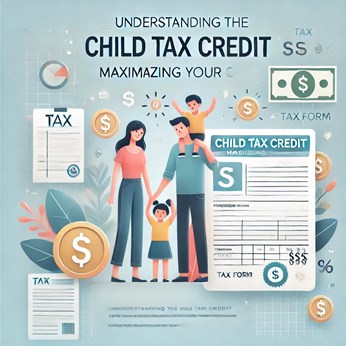Understanding the Child Tax Credit: Maximizing Your Benefits

What is the Child Tax Credit?
The Child Tax Credit (CTC) is a tax benefit designed to help families with the cost of raising children. It provides a significant reduction in tax liability for eligible parents and guardians, making it easier to manage the financial responsibilities of child-rearing.
Eligibility for the Child Tax Credit
To qualify for the Child Tax Credit, you must meet the following criteria:
- Relationship: The child must be your son, daughter, stepchild, foster child, brother, sister, step-sibling, or a descendant of any of these.
- Age: The child must be under 17 years old at the end of the tax year.
- Support: The child must not have provided more than half of their own support during the tax year.
- Residency: The child must have lived with you for more than half of the tax year.
- Citizenship: The child must be a U.S. citizen, U.S. national, or U.S. resident alien.
- Tax Identification Number: The child must have a valid Social Security Number (SSN) issued before the due date of your tax return.
How much is the Child Tax Credit?
For the tax year 2024, the Child Tax Credit is up to $2,000 per qualifying child. Up to $1,400 of this amount is refundable, meaning you can receive it as a refund even if you owe no tax. The credit begins to phase out at an income level of $200,000 for single filers and $400,000 for married couples filing jointly.
Additional Child Tax Credit (ACTC)
If you qualify for the Child Tax Credit but do not receive the full amount because your tax liability is less than the credit, you may be eligible for the Additional Child Tax Credit (ACTC). This refundable credit can provide you with a refund even if you do not owe any taxes.
How to Claim the Child Tax Credit
To claim the Child Tax Credit, you need to:
- Complete Form 1040 or 1040-SR: Use these forms to file your federal income tax return.
- Fill out Schedule 8812: This form helps you calculate the Child Tax Credit and the Additional Child Tax Credit.
- Provide the Child’s SSN: Ensure you include the valid SSN for each qualifying child.
Impact of the Child Tax Credit
The Child Tax Credit can significantly reduce your tax burden, providing financial relief and support for families. It helps cover essential expenses such as childcare, education, and healthcare, contributing to the overall well-being of your children.
Contact Sulekha
For residents of the USA and Canada, visit Sulekha Finance and Taxation to find the best tax and finance professionals in your city. Explore our blog page for enlightening articles on finance and taxation to stay informed and ma
Searching for Financial & Taxation Services? Let’s make your search simple with professionals!
Take your Financial & Taxation Services to the next level with Sulekha. Boost your online visibility, connect with more clients, and grow effortlessly!
Blogs Related to Financial & Taxation Services

Why Every Family Needs a Financial Professional Today
Money Is Confusing. A Financial Expert Makes It Simple. Between changing markets, tax rules, unpredictable expenses, and overwhelming investment choices, managing money has become more complex than ever. Even the smartest professionals often feel lo

Smart Money Starts Here: Meet Soujanya Vundavalli
Your Trusted Guide to a Confident Financial Future In a world where financial decisions feel overwhelming, confusing, and—let’s be honest—sometimes downright scary, finding a professional who brings clarity and calm is a gift. That’s exactly what S

The NRI Safety Net: Why Your Insurance is Your Biggest Tax Saver in the US & Canada
Building a Life Abroad Requires a Solid Foundation When you migrate from India, you're not just moving house; you're moving your entire financial world. You've worked tirelessly to build a successful career and a stable life for your family in the U

Stop Stressing Over Tax Season: Your Desi Guide to Seamless Accounting in the USA & Canada!
NRI Tax Jitters? You Are Not Alone!

How Can You Use Payroll Data to Improve HR Strategy?
How Can You Use Payroll Data to Improve HR Strategy? Payroll isn’t just about paying employees—it’s a goldmine of business intelligence. When analysed strategically, payroll data reveals patterns that can transform your HR strategy

Is Your Bookkeeping a Mess? Are You Missing Out on Growth Opportunities?
Is Your Bookkeeping a Mess? Are You Missing Out on Growth Opportunities?




